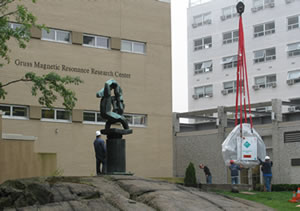NYC Council Member James Vacca Helps Brings Advanc
NYC Council Member James Vacca Helps Brings Advanced MRI Technology To Einstein College Of Medicine
December 16, 2011 – (BRONX, NY) – At a morning ceremony today, New York City Council Member James Vacca, along with administrators and faculty members of Albert Einstein College of Medicine of Yeshiva University, celebrated the re-launch of Einstein's Gruss Magnetic Resonance Research Center (MRRC). Thanks to Council Member Vacca's support, Einstein now houses an advanced magnetic resonance imaging and spectroscopy system (MRI/MRS) that provides imaging capabilities unique in the New York City area.

From left: Dean Allen M. Spiegel, M.D.; Ruth Gottesman, Ed.D., Council Member James Vacca, Craig Branch, Ph.D., Michael Lipton, M.D., Ph.D.With the help of $2 million in New York City capital funding that Council Member Vacca allocated in 2008 for the city's 2009 fiscal year budget cycle, Einstein purchased a Philips 3.0 Tesla Achieva Quasar TX Multinuclear MRI/MRS system. Representing the latest developments in the field of magnetic resonance imaging, the system – which includes a six ton magnet – provides significant enhancements in speed, image uniformity and quality of imaging in any region of the body.
"I was very happy to be able to allocate City Council capital funds to assist Einstein in purchasing this important equipment, which will enhance their already outstanding research capabilities," said Council Member Vacca. "Not only is Einstein a leader in vital and cutting-edge medical research, but it is also an outstanding member of our community here in the Northeast Bronx. It is my hope that this new technology will allow the Gruss MRRC to make big strides in understanding a wide variety of diseases and disorders."
"With the support of Council Member Vacca and the Council's Bronx delegation, Einstein now offers researchers and the surrounding community the best medical imaging has to offer," said Allen M. Spiegel, M.D., the Marilyn and Stanley M. Katz Dean of Einstein. "From understanding concussion and sleep apnea to autism and attention deficit hyperactivity disorder (ADHD), this new equipment is currently advancing our knowledge of human disease, which will ultimately lead to improvements in patient care."

A 3.0 Tesla MRI and spectroscopy system is hoisted for installation at Einstein's Gruss MRRC.Research using the new system has already impacted the local community with science at both ends of the age spectrum – from child to senior citizen. Researchers are currently mapping the atypical brain networks in children with ADHD and autism, probing structural changes in the body of obese adolescents, and studying the effects of aging on the brain.
"In addition to our existing efforts, the system allows for significant upgrades that will allow Gruss MRRC to expand its capabilities," said Craig Branch, Ph.D., director of the Gruss MRRC and associate professor of radiology and of physiology & biophysics at Einstein. "With planned improvements, we will enable new research directions, including a program to integrate MRI and other developing imaging technologies to develop noninvasive probes for the diagnosis and treatment of cancer."
The 3T MRI/MRS incorporates major advances in MRI technology, including its unique use of a dual energy source, which improves tissue visualization; 32 independent detectors, which improves image quality by a factor of 3 to 4 and greatly accelerates the speed of use; and the latest in imaging coil technology, which provides optimal and comfortable imaging of any part of the body.
Other Top Stories
9/11 World Trade Center Exposure Linked to Heart Disease Among NYC Firefighters
On Becoming a Physician: New Einstein Students Receive White Coats and Stethoscopes
Novel Therapy for Acute Migraine Shows Promise in Phase 3 Clinical Trial
First Complete Wiring Diagram of an Animal's Nervous System
Multimillion Dollar NIH Grant to Help Reduce Opioid Use & Get Care to People Who Need It
NIH Grant Funds $23 Million Study of Diseases Affecting People Living with HIV
New TAILORx Data Guides Adjuvant Therapy in Younger Breast Cancer Patients
Einstein Celebrates Its 61st Commencement
Bolstering Biopsies: Testing Patients' Individual Cells to Guide Treatment



Tablet Blog